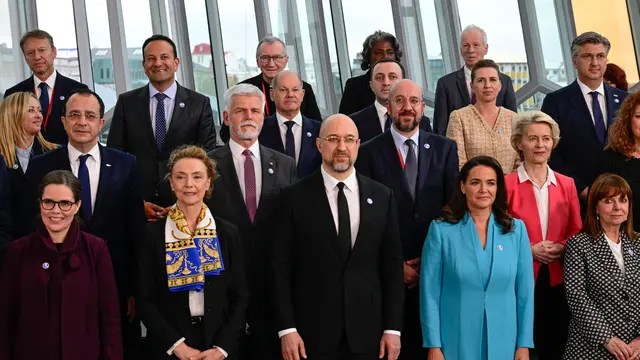European leaders are intensifying their efforts to hold Russia accountable for war crimes in Ukraine. Leaders are meeting in Iceland this week for the fourth sitting of the Council of Europe.
The continent's leading human rights organization, launched after World War II, gathered for a two-day summit in Reykjavík to reaffirm its support for Ukraine and set a firm tone on widespread human rights violations.
The Council of Europe summit comes days after Ukraine's President Volodymyr Zelenskyy's weekend of visits with major European leaders to bolster alliances. Heads of State including German Chancellor Olaf Scholz, Britain's Prime Minister Rishi Sunak and French President Emmanuel Macron were among the 46-member states in attendance at the Reykjavik summit.
While Zelenskyy addressed his counterparts via videolink, Ukraine Prime Minister Denys Shmyhal represented the country at the event.
Gathering information on human rights abuses in Ukraine was central to the agenda, as well as how to organize the military logistics to further support Kyiv and draw up a 'Register of Damages.'
European Commission President Ursula von der Leyen described the register as an essential "judicial element to ensure justice for war victims."
The Register of Damages is a tool to record evidence and claims of damages, loss and injuries incurred as result of the conflict and Russia's sustained attacks. This week Ukraine's capital Kyiv was hit by more overnight air strikes. By the end of the meeting, the 46 countries agreed on the creation of the Register of Damages.
Von der Leyen added: "I also expect the leaders to rally behind two main principles: The first principle is that we will keep supporting Ukraine, for as long as it takes. The second principle is nothing about Ukraine without Ukraine."
To date, European allies spent at least $74 billion in funding Ukraine's efforts. Along with stepping up financial support, Von der Leyen committed to an increase in military stocks and training for Ukrainian soldiers.
Russia quit the Council of Europe last year, preempting its expulsion after the conflict began. Discussions on Türkiye's future as a member of the human rights watchdog were also tabled.
Türkiye - in the middle of a presidential election - also faces the boot over failing to implement a 2019 court judgment to free jailed businessman and philanthropist Osman Kavala. The 65-year-old was arrested in 2017.
Kavala was in detention for more than four years until his trial despite widespread international criticism. His arrest and conviction drew condemnation from the European Court of Human Rights that determined there was insufficient evidence to warrant his detention. It also believed he was targeted in a bid to silence human rights defenders and the plurality of dissent against the government.
The Council's Committee of Ministers have started infringement proceedings against Türkiye, but have chosen to focus on dialogue for the time being. It could move to suspend Türkiye's membership should the government fail to heed the human rights obligations of the Council of Europe.
(CGTN)
 简体中文
简体中文

